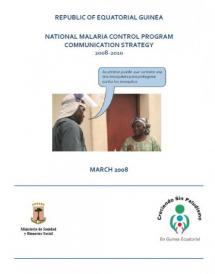National Malaria Control Communication Strategy 2008-2010, Equatorial Guinea
The National Malaria Control Program of the Ministry of Health and Social Welfare of Equatorial Guinea is implementing an ambitious, comprehensive strategy with the goal of drastically reducing the transmission of malaria throughout the country. The program components include semi-annual indoor residual spraying (IRS), distribution of long-lasting insecticide-treated nets (LLINs), diagnosis and treatment of cases with artemisinin-based combination therapy (ACT), intermittent preventive treatment for pregnant women (IPT), behavior change communications (BCC), and a rigorous monitoring and evaluation system that includes vector surveillance, strengthening of the national health information system, and annual parasitemia surveys.
The BCC component of the program seeks to support all malaria intervention areas by promoting key desired behaviors: increased early care-seeking and adherence to correct treatment, increased use of IPT, increased household acceptance of IRS, and increased consistent use of LLINs. In order to achieve the program’s behavioral objectives, a comprehensive communication strategy that harmonizes messages and employs multiple communication channels was developed through a consultative workshop with the participation of key members of its partners in malaria control.
Source: Democratic Republic of the Congo, Ministry of Health and Social Welfare
Date of Publication: March 25, 2019
SIMILIAR RESOURCES
Tools
Examples
- Integrated Management Strategy for Dengue Prevention and Control
- SBCC for Malaria in Pregnancy: Strategy Development Guidance
- Promoting Quality Malaria Medicines Through SBCC: An Implementation Kit
- Dengue: Guidelines for Diagnosis, Treatment, Prevention and Control
- Crisis and Outbreak Communication Pandemic Flu and Other Disasters
- Desk Review of Programs Integrating Family Planning with Food Security and Nutrition
- WHO Water, Sanitation and Hygiene Strategy 2018-2025
- Population, Health, and Environment Basics
- Malaria Social and Behaviour Change Program Guidance in the Context of COVID-19 Pandemic
- Tailoring Malaria Interventions in the COVID-19 Response
- Zanzibar Communication Strategy for Malaria Control, 2008-2012
- Rwanda Malaria Communication Strategy 2010-2012
- Communication Strategy for Malaria Control Interventions, Tanzania 2008 - 2013
- Communication and Social Mobilization for Malaria Prevention and Control in Myanmar
- National Communication Strategy for Malaria Control in Uganda

